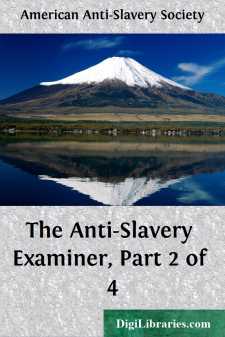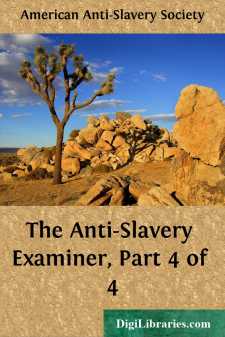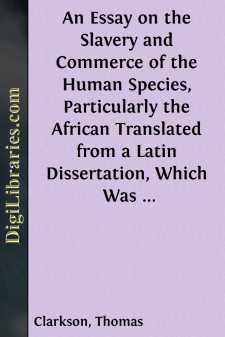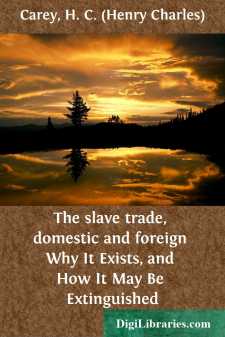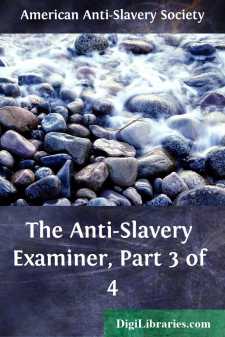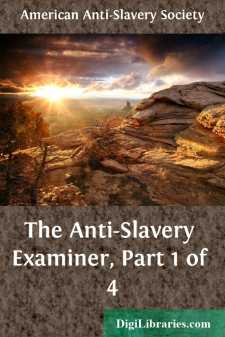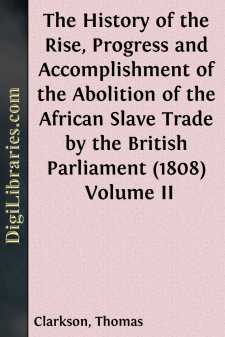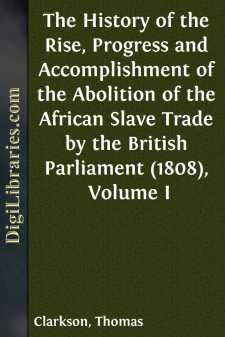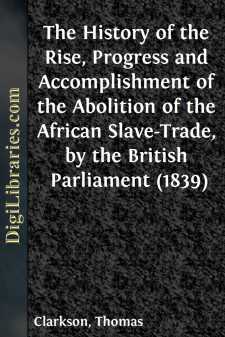Social Science
- Americana 1
- Anthropology 4
- Archaeology 7
- Criminology 2
- Emigration & Immigration 2
- Folklore & Mythology 46
- General 1
- Slavery
- Sociology 10
- Sociology of Religion 1
Slavery Books
Sort by:
POWER OF CONGRESS OVER THE DISTRICT OF COLUMBIA. A civilized community presupposes a government of law. If that government be a republic, its citizens are the sole sources, as well as the subjects of its power. Its constitution is their bill of directions to their own agents--a grant authorizing the exercise of certain powers, and prohibiting that of others. In the Constitution of the United States,...
more...
THE NEW TESTAMENT AGAINST SLAVERY. "THE SON OF MAN IS COME TO SEEK AND TO SAVE THAT WHICH WAS LOST." Is Jesus Christ in favor of American slavery? In 1776 THOMAS JEFFERSON, supported by a noble band of patriots and surrounded by the American people, opened his lips in the authoritative declaration: "We hold these truths to be SELF-EVIDENT, that all men are created equal; that they are...
more...
by:
Thomas Clarkson
PART I. When civilized, as well as barbarous nations, have been found, through a long succession of ages, uniformly to concur in the same customs, there seems to arise a presumption, that such customs are not only eminently useful, but are founded also on the principles of justice. Such is the case with respect to Slavery: it has had the concurrence of all the nations, which history has recorded, and...
more...
CHAPTER I. THE WIDE EXTENT OF SLAVERY. Slavery still exists throughout a large portion of what we are accustomed to regard as the civilized world. In some countries, men are forced to take the chance of a lottery for the determination of the question whether they shall or shall not be transported to distant and unhealthy countries, there most probably to perish, leaving behind them impoverished mothers...
more...
NARRATIVE OF MR. CAULKINS. I feel it my duty to tell some things that I know about slavery, in order, if possible, to awaken more feeling at the North in behalf of the slave. The treatment of the slaves on the plantations where I had the greatest opportunity of getting knowledge, was not so bad as that on some neighboring estates, where the owners were noted for their cruelty. There were, however,...
more...
THE ANTI-SLAVERY EXAMINER VOL. I. AUGUST, 1836. NO. 1. TO THEPEOPLE OF THE UNITED STATES;OR, TO SUCH AMERICANS AS VALUE THEIR RIGHTS, ANDDARE TO MAINTAIN THEM. FELLOW COUNTRYMEN! A crisis has arrived, in which rights the most important which civil society can acknowledge, and which have been acknowledged by our Constitution and laws, in terms the most explicit which language can afford, are set at...
more...
by:
Thomas Clarkson
CHAPTER I. Continuation from June 1788 to July 1789—Author travels to collect further evidence—great difficulties in obtaining it—forms committees on his tour—Privy council resume the examinations—inspect cabinet of African productions—obliged to leave many of the witnesses in behalf of the abolition unexamined—prepare their report—Labours of the committee in the interim—Proceedings...
more...
by:
Thomas Clarkson
THOUGHTS, &c. I know of no subject, where humanity and justice, as well as public and private interest, would be more intimately united than in that, which should recommend a mitigation of the slavery, with a view afterwards to the emancipation of the Negroes, wherever such may be held in bondage. This subject was taken up for consideration, so early as when the Abolition of the slave trade was...
more...
by:
Thomas Clarkson
CHAPTER I. No subject more pleasing than that of the removal of evils—Evils have existed almost from the beginning of the world—but there is a power in our nature to counteract them—this power increased by Christianity—of the evils removed by Christianity one of the greatest is the Slave-trade—The joy we ought to feel on its abolition from a contemplation of the nature of it—and of the...
more...
by:
Thomas Clarkson
CHAPTER I. HISTORY OF THE ABOLITION OF THE SLAVE TRADE. No subject more pleasing than that of the removal of evils.—Evils have existed almost from the beginning of the world; but there is a power in our nature to counteract them—this power increased by Christianity.—Of the evils removed by Christianity one of the greatest is the Slave Trade.—The joy we ought to feel on its abolition from a...
more...


